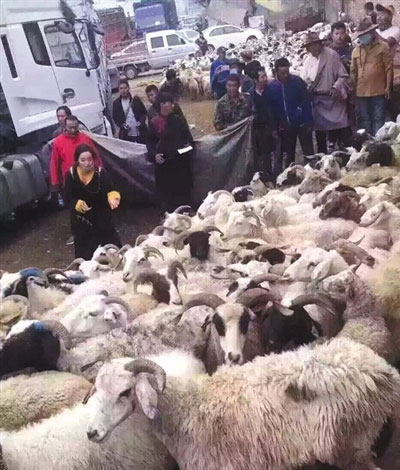 |
|
Drolma, a Tibetan woman in Ganzi, Tibetan Autonomous Prefecture in Southwest China's Sichuan province, was reported to have released 6,387 goats to a prairie in Sertar County. [File photo/ifeng.com] |
Drolma, a Tibetan woman in Ganzi, Tibetan Autonomous Prefecture in southwest China's Sichuan Province, was reported to have released 6,387 goats to a prairie in Sertar County after she saved them from slaughter houses with 5.1 million yuan (around $763,000) of donated money, organized by a group called "Snowland Release Group".
The incident immediately drew great attention after it was exposed on September 4 on Sina Weibo, Chinese version of Twitter, with some praising her for doing a good deed and others, including experts, fearing the environmental balance of the prairie could be harmed with such a large number of goats suddenly introduced to the ecosystem.
Later it was revealed that the woman was just sending those goats to a local pasture and not releasing them randomly, but despite this the incident revealed the seriousness of the problem in China and some people's attitude towards it.
There have been a number of reports recently in China in which captive animals were released randomly into the wild by animal activists or by those following a Buddhist ritual known as "fangsheng" or "release life" which demonstrates spiritual compassion and piety by releasing captive animals back into nature.
However, experts say an ecosystem has a very delicate balance which could be jeopardized easily by changing the number of certain species or introducing a new species to the area.
The revised China's Wild Animal Protection Law is to take effect starting from the year 2017, with added special items to regulate the release of captive animals into the wild.
Any organization or individual releasing captive animals should choose indigenous species that are fit to survive in the wild, and the release should have no impact upon local people or harm to the ecosystem, the law said. Anyone who frees captive animals in a reckless manner and thus causes property damage or physical injury to others, or jeopardizes the ecosystem, will be held accountable.
